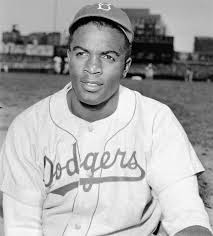Today I am invoking the Howard Cosell Rule. Today’s post, therefore, will not relate to my rides or bikes, and may not be connected to much else in the cycling world. But what I’m about to mention is just too important to ignore.
The athlete I’m about to mention has something in common with Simone Biles, Colin Kaepernick, Billie Jean King, Muhammad Ali and “Major Taylor. Like them, he was a pioneer, not only in his sport, but in the struggle to be recognized and understood as full-fledged human beings. In other words, they (have) had as much impact away from the field, court or track as they had on it.
On this date 75 years ago, a second baseman took his position at Brooklyn’s Ebbets Field. At 28 years old, he was older than most rookies. But that wasn’t because he was a “late bloomer.” Rather, his debut in Major League Baseball was delayed by his World War II military service, where he experienced the very thing that kept him from playing for the Dodgers earlier than he did.
When he was drafted into the Army, he applied for Officers’ Candidate School, for which he was qualified. His application was delayed for several months. When he was finally accepted, he led soldiers who, like him, were racially segregated from other soldiers as they fought for the freedom of people in faraway countries.
What this man had in common with the other athletes I mentioned, with the exception of Billie Jean King, is that he was Black. So, upon returning to the United States, he played a year for the Kansas City Monarchs of the Negro Leagues and another for the Montréal Royals, the Brooklyn Dodgers’ top minor-league team.
When Jackie Robinson took to the field for the Brooklyn Dodgers on 15 April 1947, he was the first known Black major-league player* since Moses Fleetwood Walker in 1884. Robinson’s debut also came half a century after “Major” Taylor, the record-setting cyclist, became the first Black world champion in any sport.
Consider this: When Robinson played his first game as a Dodger, the United States armed forces had yet to integrate. Yes, you read that right: Black soldiers could still be sent to fight for freedoms they couldn’t enjoy themselves. And, a year later, Strom Thurmond would run for President on a platform of “Segregation Forever!”
All right, this post does relate to cycling in at least one way: In spite of his accomplishments on and off the field, Jackie Robinson, like Taylor before him, had to endure insults, indignities and even death threats. And, in a sort of parallel, Robinson had to go to other leagues, as Taylor had to go to other countries , for professional opportunities commensurate with their talents and work ethic.
So, if Jackie Robinson doesn’t deserve a mention on this or any other forum, I don’t know who does.
*—For all of the respect I have for Jackie Robinson, I am willing to entertain the notion that he wasn’t the first Black major league player since Walker. It’s entirely possible that some Black player who “passed” as White—including, it’s been rumored, Babe Ruth—could have played in the major leagues.


.jpg)




